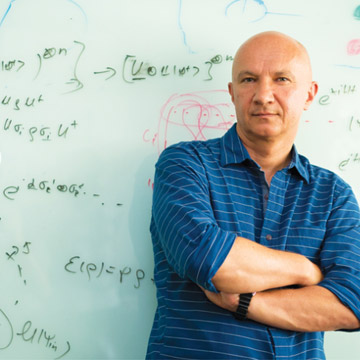Letter from the director
I was recently asked whether it is still fun to run CQT. Apparently after seven years one is supposed to be bored and tired. There is even a name for this. It is known as "the seven year itch", a time of potential crisis when you take stock of your relationship. As CQT passed its seven year mark in December 2014, I decided, with some trepidation, to pause for a moment and reflect upon the question.
Needless to say, my internal perspective on the success of the Centre differs to the one documented by the statistical data that you find in abundance in our reports. To be sure, the facts are impressive. As our Annual Report for 2014 will tell you, in the past year we published more than 190 scientific papers, had eight more students graduate and added a few more grants to our portfolio. You will also read that we organised workshops and conferences, established new collaborations and even helped Singapore's Prime Minister satisfy his scientific curiosity by observing entangled photons with his own eyes. You will discover that we spread the word about quantum by taking part in the Singapore Science Festival, working with Scientific American and Nature on a film competition and having hundreds of students visit our Centre. These are commendable achievements and I am very proud of them. However, at a personal level, I take most satisfaction from the community we have built.
When you hire a bunch of creative individuals from all over the world, you must be prepared to deal with them in sometimes unconventional ways. You have to be on your toes, always ready to discuss, advise, encourage and, from time to time, calm emotions and extinguish local fires. The goal is to create a community that has more potential than the sum of its individuals, and it requires fine-tuning a complicated human dynamic. When it works, it works beautifully, and it is exactly this part of my role that I find the most rewarding.
It may sound trivial, but I truly believe that teamwork is behind our achievements, counting the effort not only of those who crank equations and turn knobs on our quantum contraptions, but also those who solder wires, check air-cons, marshal visitors, prepare contracts, count money and clean the coffee machines. There are no performance measures for shaping a community, for it can hardly be quantified. Still, when we proudly call ourselves CQTians, we instinctively acknowledge the cohesion we have nurtured over the past seven years.
Our aim is not achieving a temporary peak of research excellence, but rather creating a research environment in which investigations into quantum technologies can flourish for years to come. There are many challenges ahead. We have to consolidate our position in the field, innovate and stay competitive. The consolidation will necessarily involve closer collaborations between different groups within CQT, meaning teamwork will be even more important in years to come.
It takes time and effort to develop a sense of community, and it takes at least the same amount of energy to maintain it. Thus, to be honest, I have no time for the seven year itch. I am filling my mind with fresh ideas and getting ready for action. Taking a break is not an option. You can take it easy when you're dead – living is about the thrill of doing as much as you can. So, we will be busy and you will surely read about all we do in 2015 over the course of the year. For now, find a round-up of all we accomplished in 2014 in our most recent Annual Report. It follows our tradition of making our reports readable, informative and entertaining.

Artur Ekert was CQT's founding Director, leading the Centre from December 2007 to July 2020. He was also the Lee Kong Chian Centennial Professor at the National University of Singapore and the Professor of Quantum Physics at the Mathematical Institute, University of Oxford, UK. He is one of the pioneers of quantum cryptography. He has worked, communicated with and advised several companies and government agencies.
His current research extends over most aspects of information processing in quantum-mechanical systems. He is a recipient of several awards, including the 1995 Maxwell Medal and Prize by the Institute of Physics and the 2007 Royal Society Hughes Medal. In his non-academic life he is an avid scuba diver.






